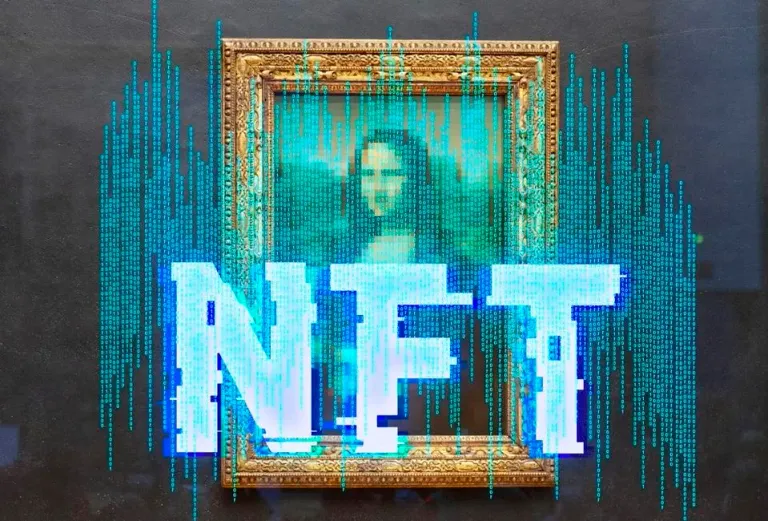
NFT: non-fungible token, digital art protected by the blockchain. GETTY
https://www.forbes.com/sites/digital-assets/article/what-is-nft-art-how-to-create-it/
NFT or Non-Fungible Tokens are digital assets that are unique and can’t be swapped for something that has an equal value. Before watching a guest lecture by Drs. Jonathon and Quinn Button titled, “NFTs: More Than Digital Art”, I had never heard of an NFT. I was unaware of the expanse of the digital world in general. Because of this lack of knowledge, I was skeptical about the concept of an NFT. Upon finishing the lecture and doing my own research, I concluded that there is a mix of good and bad things associated with NFTs, as there are with just about anything. Even in this guest lecture, Drs. Jonathon and Quinn talk about many seemingly good aspects of NFTs but still warn you to do your own research and not put money into it if you’re not willing to lose it.
One of Dr. Jonathon and Quinn’s points in their lecture was that, as the title of the lecture would suggest, NFTs are more than just digital artwork, as some people who know about NFTs might be inclined to presume. They can also be music, fashion, membership, or even sports. This expanse in genres allows for a larger and more diverse audience to connect with NFTs. I think that this is a great way for brands, companies, and artists to better connect with their customers while simultaneously becoming more well-known and ultimately growing. It basically seems like it is a whole other market that is just waiting for more companies to join. I would say that this is a good aspect since it, as I said before, allows companies to grow and provides consumers/ customers with more products (physical or digital) that they might enjoy.
Each NFT has a unique code, called a token, which is stored and managed on something called a blockchain. A blockchain is essentially just a digital record-keeping system that records an NFTs (usually cryptocurrency) transaction history. A blockchain is reliable, transparent, and easy to keep up with. With tangible items such as a prized baseball card, a collector might have to keep up with past receipts, previous packaging, and possibly even information about who or what company manufactured it if they ever wished to sell it. With this digital form of record-keeping, all of that information will be in one place at all times and should be automatically updated. The lack of burden associated with owning an NFT is a unique and valuable feature in my opinion. This might make some collectors value owning NFTs over more tangible things, though I do think that the authenticity of owning a real tangible object could still be more valued.
One of the issues I can see with having NFTs as assets is the possibility of fraud or scams. “Wash trading” is when a person curates the appearance of demand for a product by using fake accounts to “buy” the product, each time selling/buying at a higher price. This creates the illusion of a hot commodity. This allows a fraudulent person to sell their good, in this case, an NFT, for a higher price than it is actually worth to an unsuspecting buyer. This is especially concerning because with NFT transactions, it is irreversible since they are recorded on the previously mentioned blockchain. So, if an individual is scammed in such a way as this, it seems that (at this time) there is no way to get their money back.
In the guest lecture, there is a lot of mention about how very well-known companies sell NFTs to basically promote business and in turn, it is a really interesting way for consumers to obtain specialty items. While this is a positive aspect of NFTs, it also makes me think that companies could sell fake NFTs somehow. Of course, this probably wouldn’t happen with real and established companies like Apple or Gucci. Instead, I feel that someone or a group of people could impersonate an established company to make a profit for themselves. As mentioned previously, NFT transactions are irreversible and once again, your money will be gone.
Non-fungible tokens have many good aspects. One of the biggest of those in my opinion is that it allows a company to expand and consumers to connect with one another and the company itself. They do also have flaws, one that concerns me is the seemingly large susceptibility to scams. Overall, the world of NFTs is still fairly new and with most new things, there is risk associated but, as Drs. Jonathon and Quinn Button said in their lecture, that people were skeptical about investing in Tesla and just look at how that turned out. With this in mind, perhaps NFTs are worth a shot, but it is wise to stay cautious.
Works Cited:
Garnett, A. G. (2024, June 9). Pros and Cons of Investing in NFTs. Investopedia. https://www.investopedia.com/pros-and-cons-of-investing-in-nfts-5220290
Ingold, L. (2022, September 21). NFTs: Risks, Rewards, Ethics. Seven Pillars Institute. https://sevenpillarsinstitute.org/nfts-risks-rewards-ethics/’
Sharma, R. (2024, June 12). Non-Fungible Token (NFT): What It Means and How It Works. Investopedia. https://www.investopedia.com/non-fungible-tokens-nft-5115211